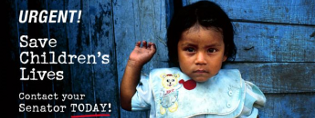USA (MNN) — With nearly one
billion people suffering from hunger worldwide, members of Congress are looking
at gutting international aid.
Food for the Hungry U.S.
president and global executive, David Evans, calls the cuts "disproportionate." "They
proposed an average of 8% cuts in discretionary funding across all
areas, but the cuts in international relief and development assistance range
from 41% to 67%."
In response, FH joined a
coalition of 30 religious and faith-based leaders and signed a letter to U.S.
Senate members urging them to reverse the reductions to international
assistance passed by the U.S. House of Representatives. "All Non-Governmental Organizations that are benefitting
from foreign assistance from the U.S. government will be affected in one way
or another, so there's really no area that's been spared the knife."
Evans thinks that the deepest
cuts targeted international assistance because it's an "easy target." The
coalition has to counter the prevailing school of thought: "If we have a budget deficit, why are we
giving this money to other countries?"
In fact, a recent Pew Research Center
survey asked Americans how much of the government's budget they thought went to
foreign assistance. The average response was 25%. When they were asked how much they felt
should go to foreign assistance, they said no more than 10%.
Evans says, "There's this huge
difference between reality and perception. Our message is: ‘If Americans feel like it should be 10%, then that's great. We'd take 10%. Given that it's only one half of one percent,
this is not the area to be making cuts. Even if foreign aid were completely
abolished, it would not make any recognizable dent in the current budget deficit."
Cuts proposed in the House of
Representatives budget resolution include slashing U.S. food aid programs by
41% ($687 million), Office of Foreign Disaster Assistance funding by 67% ($875 million), development assistance by 30% ($747 million),
global health and childhood survival programs by 15% ($365 million), all
from FY 2010 enacted levels, according to budget analyses.
The Senate passed a two-week
extension of the budget that would fund the government until March 18, all the
while countering with proposed $4 billion in federal spending cuts, somewhat
less drastic than the steeper cuts endorsed by the House. "Our desire now–in the U.S. Senate, where the debate is happening–is that some of these cuts
would be restored, particularly in areas where it helps the poorest of the poor
and the most vulnerable."
There's still time for you to get
involved. Evans says, "Talk to your
senators. Talk to your representatives about the good that some foreign
assistance does for the world's poor."
The budget measure would deny
roughly 18 million poor and vulnerable people life-saving physical and spiritual
help. "U.S. government funding allows
us to be in a number of countries that we might not be in if we didn't have
that resource, sharing the Good News of Jesus Christ and working with local
churches, helping to build those churches and build their capacity. All of that
would be curtailed–if not shut down completely–in those areas where we're
highly dependent on this resource to be there."


